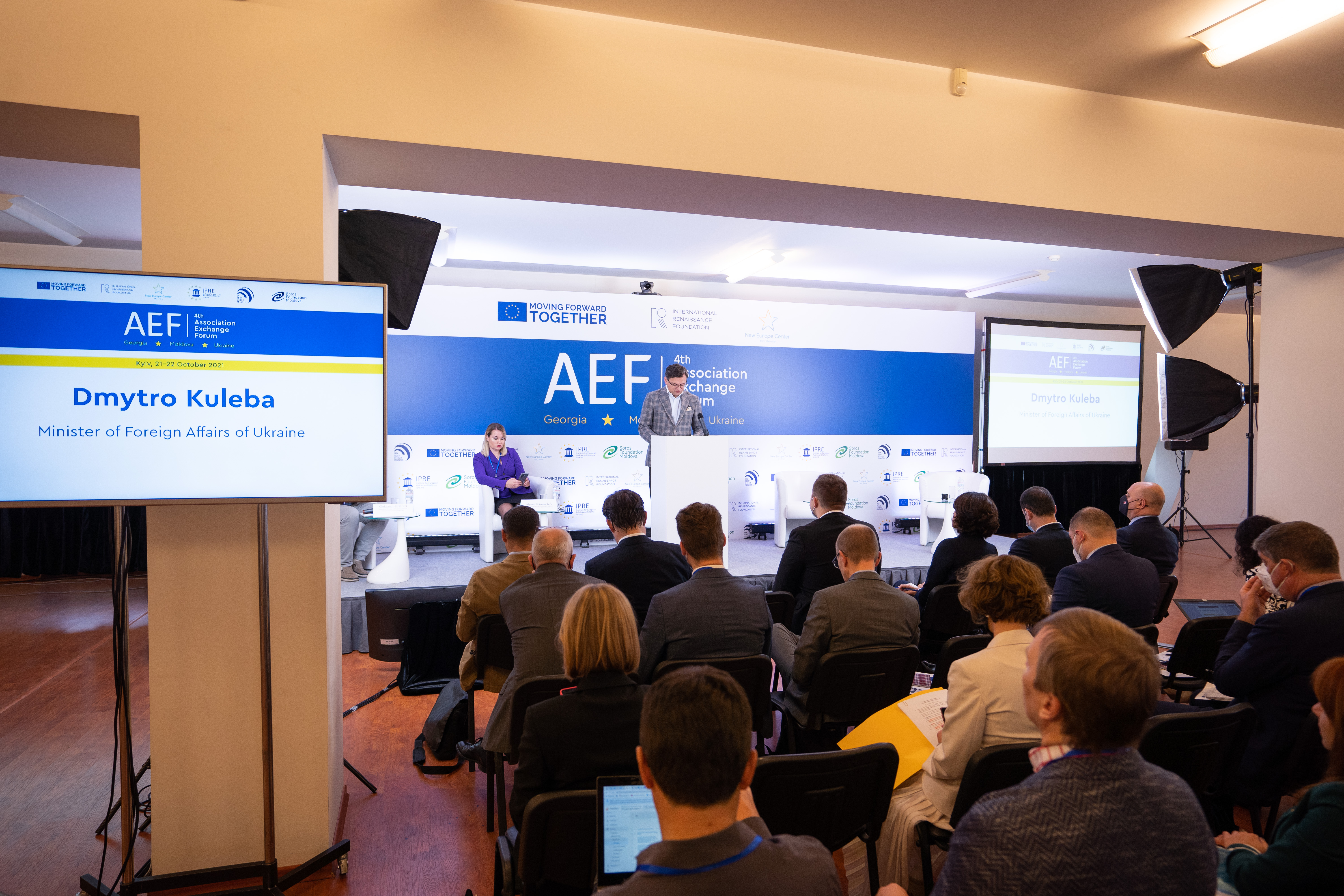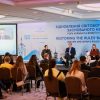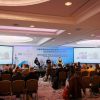The New Europe Center offers to your attention the transcript of speech by Dmytro Kuleba, Minister for Foreign Affairs of Ukraine, at the New Europe Center event “4th Association Exchange Forum”.
You can find the video recording from the event in English here.
I am honored to welcome all of you in Kyiv at the 4th Association Exchange Forum.
Last time I took part in this forum was in 2019. Honestly speaking, it now seems as if it was in another life. Back then we didn’t know all of those types of viruses and vaccines and simply enjoyed our pre-pandemic lives not knowing what was ahead.
A lot has changed in these two years. We have faced new challenges, globally and in our region, new problems and threats, but we have also re-discovered solidarity, formed new alliances, developed new strategies and shaped new foreign policy approaches to streamline our European integration.
Not only the COVID-19 pandemic has changed our world. Our region undergoes, once again, a fundamental geopolitical transformation. Balances shift and – spoiler – we work hard to shift them in our favour.
The Eastern Partnership is not what it used to be. Armenia and Azerbaijan fought a war. Belarus slided away from the European path into Putin’s claws. Russia’s attempts to use natural gas as a weapon significantly intensified.
Not only the Eastern Partnership, but the entire so-called “Post-Soviet Space” is no longer what it used to be. Actually, there is no such thing as “Post-Soviet Space” anymore. Trajectories of this region’s countries have been way too different for way too long.
These past two years have shown that the civilizational cleavages between groups of the countries are getting deeper. There is literally little reason to see the region through a single lens.
International affairs have entered a period of fragmentation and antagonism. This period will be over one day. Once we are out of shifting sands, traditional alliances will be reshaped. And as we all know, crises bring not only threats, but also opportunities.
We have clearly seen these challenges coming and unfolding and wasted no time to take decisive, bold and proactive moves to mitigate them and confidently navigate our European and Euro-Atlantic course through the muddy waters of change.
In these past two years, Ukraine became an Enhanced opportunities partner of NATO. We have created three new regional alliances. We have formed the Lublin Triangle with Poland and Lithuania, Associated Trio with Georgia and Moldova, Quadriga with Turkey. We have also created the Crimea Platform with 46 member states and international organizations. Ukraine has signed four declarations on European perspective with EU states. Three more are coming soon.
These are not just separate diplomatic initiatives. All of them are part of a new, ambitious and mature foreign policy. Let me remind everyone that this year we adopted, for the first time in 30 years of independence, the Foreign Policy Strategy of Ukraine.
Regional alliances and Ukraine’s proactive policy in the Baltic-Black Sea region are reflected in this document. This strategy is firmly navigating Ukraine to reach our objectives even in the current circumstances of global instability, regional challenges and international antagonism which paralyzes large established blocks of states.
Flexible supplementary regional alliances are a new trend in international affairs. With the Lublin Triangle, Associated Trio, Quadriga and the Crimea Platform Ukraine is leading, not just following this trend. Those alliances are more effective than the established old ones, because they unite like-minded states around very practical tasks and steps in their respective regions. When members of an alliance share the same vision of the past, present and the future, it allows them to take swift decisions and act efficiently where large entities would have needed months to deliberate and overcome internal disagreements.
Today, I would like to pay special attention to the Associated Trio.
Together with my Georgian and Moldovan counterparts we created this new format of international cooperation on May 17th this year in Kyiv.
The idea of Ukraine, Georgia and Moldova joining forces within the Eastern Partnership went a long way from being almost rejected in Brussels to accepting it as a new reality. I am glad that we were able to overcome skepticism. Just a few days ago, on October 12th, we hosted the 23rd Ukraine-EU Summit. The Associated Trio was reflected, for the first time, in its joint statement.
I want to stress that the Associated Trio underpins the strategic importance of the Eastern Partnership, not undermines it. Differentiation principle of the initiative is a driving force, not a roadblock. The Associated Trio is not closed to other participants. We are eager to share our experience with others and motivate them to follow our suit and our European integration footsteps. We believe that our success will inspire others and become a strong and positive transformative force in the region.
Ukraine, Georgia and Moldova form a very natural alliance in our region. In a broader historical perspective, we are the only three nations of the so-called “Post-Soviet Space” that can actually be clearly grouped together. In the current political turmoil and security vacuum in our region, the Associated Trio is an island of stability, democracy and resilience.
The events of the past two years forced us to step out of our comfort zone and to urgently focus on resilience. Be it countering Russian aggression and its hybrid warfare in Europe, gas price manipulation, fighting the pandemic, natural disasters or joint rescuing EU and Ukrainian citizens in the conflict zones.
Taking this opportunity, I would like to thank our European partners for their firm support of Ukraine’s sovereignty and territorial integrity, including implementation of the non-recognition policy of the illegal occupation of Crimea by Russia.
Ukraine highly appreciates the EU’s firm position on sanctions against Russia in response to its aggression against Ukraine. We also commend the EU for its resolute support for the Crimea Platform and participation in the Platform’s inaugural summit this year.
The Association Agreement with Ukraine, Georgia and Moldova became the most ambitious treaties the EU has ever concluded with an international partner. Moreover, today we have come to the state of self-reflection – whether the goals of the Ukraine-EU Association Agreement are met, what has to be fine-tuned. We are considering how to further raise the ambitions of our integration in order to develop the full potential of our association.
The EU has never done such an exercise with any other partner country. Ukraine goes side by side with the EU in its foreign and security policy, being a reliable partner of the Union on the international fora and an important contributor of European security.
Ukraine and the EU became close and important trade partners to each other and are working closely together to boost further development of the DCFTA. Next important step is the ACAA agreement which will create new opportunities for our businesses.
We are interested in making more commitments in the new priority areas of the EU, such as the European Green Deal, the Digital Single Market and the Energy Union. We are not just willing to align with these ambitious policies, we are ready to contribute to their successful implementation along with the Member States.
Next big thing is green hydrogen. The EU defined Ukraine as a priority partner in supplying this new type of energy to the European consumers. We have the resources, the political will and the ambition to make Ukraine a key green hydrogen supplier to the EU. First projects are already launched and the optimistic scenario is that by 2024 we will be able to launch first export supplies. We are not afraid of stepping forward into an uncharted territory. As I said earlier, one word that describes President Zelenskyi’s foreign policy is “ambition”. President sets out very ambitious goals, but this is the only way to reach big ambitious results.
At the 23rd Ukraine-EU Summit we reached some far-looking agreements, out of which I would particularly mention our gradual integration into the EU Single Market. This didn’t seem feasible just a year ago. I’m happy to congratulate all of us on the signature of the Common aviation area agreement.
The developments I mentioned mean that our ambitious goals are absolutely reachable.
There have always been many sceptics of Ukraine’s European success. They doubted the signing of the Association Agreement, the visa-free, the Common aviation area and so on. Their skepticism has only mobilized our efforts and pushed us to be more proactive and forward-looking. We have always believed in our cause.
Europe cannot be complete without Ukraine. Ukrainian identity is part of the mosaic of European identities. I am happy that more and more European nations and their leaders clearly perceive Ukraine in the European context.
We need a clear signal that our ambitions matter, that our European aspirations are welcome, that our reforms are systemic in a sense that they contribute to the pan-european legal order.
The goal of EU membership is sealed in our Constitution and this process is irreversible.
We understand that every next wave of the EU enlargement gets more demanding. We are implementing ambitious reforms under increasingly challenging circumstances. But any commitment needs a goal. Our key expectation from the EU in this regard is to grant Ukraine the European perspective. This decision would require simply a political will of the EU, with no institutional commitments, but it will play a very significant role.
Firstly, a certain EU perspective will be a huge motivating and transformational force for Ukraine. Secondly, it will bring a lot of geopolitical certainty to our part of Europe. Thirdly, it will put an end to the Kremlin’s senseless attempts to revert the European choice of Ukraine.
In this regard, we are thankful to Estonia, Lithuania, Latvia and Poland, who officially recognized the European perspective of Ukraine and agreed in due time to support our EU membership application.
I am confident that the circle of the EU Member States, which are ready to recognize the reality of the European future of Ukraine, and, I believe, Moldova and Georgia, will steadily expand.
Finally, we need to get away from “too big”, “too early”, “too difficult” narratives. The European perspective should be on our joint “to do” list. What if the founding fathers of the European Union said, “Ah, nay. That’s too ambitious. Let’s not risk”? What if Robert Schuman said, “No, I think we’re not ready yet”?
To be true, I sometimes doubt whether we have this big vision and ambition in Brussels today. This is why we need the Associated Trio. Our three nations form a strong European force in our region. We proceed on our European path of development no matter which domestic challenges or external threats we face. The Associated Trio is here to stay. It is part of the new reality.
I am confident that the period of global turmoil, fragmentation and antagonism in international affairs will be over one day. This will also be the day Ukraine’s place as part of the West is institutionalized and cemented. Be it the EU and NATO membership or any other way. Because this is where we belong. This is who we are. This is where our future lies.
But our security, prosperity and freedom is not somewhere abroad. They are here, in Ukraine. We can not and should not wait for someone to solve our problems and craft a better future for us. This is what we can do and what we already do today. European Integration, first and foremost, helps us develop Ukraine. The Associated Trio is a good example of this. As one saying goes, “The best way to predict the future is to create it”. We are creating a European future for Ukraine, a European state.
Our proactive foreign policy and the Foreign policy Strategy of Ukraine are aimed at achieving this goal and we will not step aside.












